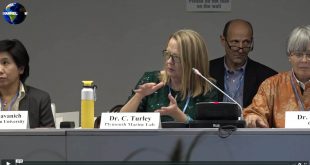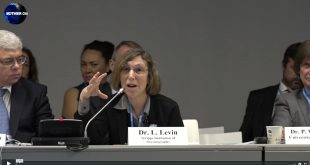Press briefing: Soil Carbon Sequestration and Food Security
Johannes Lehmann
Cornell University
Dawit Solomon
Climate Change, Agriculture and Food Security (CCAFS)
Addis Ababa
Cornell University
Johannes Lehmann and Dawit Solomon highlighted the importance of soil organic carbon in the global carbon cycles, stating that every 7-10 years all carbon in the global vegetation has cycled through soil. That makes soil the largest carbon store in terrestrial environments, 4-5 times larger than what is in the atmosphere.
But soil is not only important in the global carbon cycles, it also is the foundation for soil fertility and an important avenue to achieving food security. Dawit shared work from Western Africa where indigenous populations have managed their soils so well that they contain 2-3 times more carbon than surrounding soils, clearly showing that it is possible to dramatically reduce atmospheric carbon dioxide with soil carbon sequestration.
Johannes made the point that soil carbon management must be adapted to local conditions and that both implementers, but also scientists confuse what is perfectly explainable variability with uncertainty. They provided an exciting example from Ethiopia where national projects, started in the 2000s for improving food security, have actually been AS EFFECTIVE in reducing greenhouse gas emissions as any project designed to mitigate climate change. Soil carbon contributed to one third to overall emission deductions. And the costs were with $0.4 /CO2e/yr surprisingly low compared to carbon prices of $20 or $100 /CO2e/yr demanded by many.
The press conference ended with a lively discussion about the time required to increase soil carbon stocks.
http://unfccc.cornell.edu/files/2017/11/Lehmann-PressConference-COP23-Bonn-2017s-1pipiyo.pdf
 Mother Channel Environmental, climate change news and media.
Mother Channel Environmental, climate change news and media.



